#generalshipping
Text
I have decided that Show!Cryptor and Show!Sentry are scout talents. They get to cuddle in flowers together in their off time.
Sentry also totally strokes Malware’s wings very gently
#ninjago#ninjago au#spbnr aus#pixie hollow au#ninj hollow au#general cryptor#ninjago cryptor#cryptor ninjago#general sentry#ninjago sentry#sentry ninjago#generalshipping#ninjago generalshipping
13 notes
·
View notes
Text
But the war disclosed no great generals, for the simple reason that, except for the opening phase of retreat from Mons and the advance back to the Aisne, the move round to cover the Channel Ports, and the final advance of all, there was little scope for generalship.
Once trench warfare set in everyone was bound to the wheel; and when the High Command gave it a turn, Army, Corps and Divisional commanders turned with it.
Both sides were locked in a stranglehold from which neither could break away; they shifted their grip occasionally, and now and then got in a good body blow, but the end could only come with the physical and moral exhaustion of one or the other.
General John Burnett-Stuart in his private memoir of the war.
#little scope for generalship is the title of one of my thesis chapters#my research#ww1#british army#john burnett-stuart#history
21 notes
·
View notes
Text
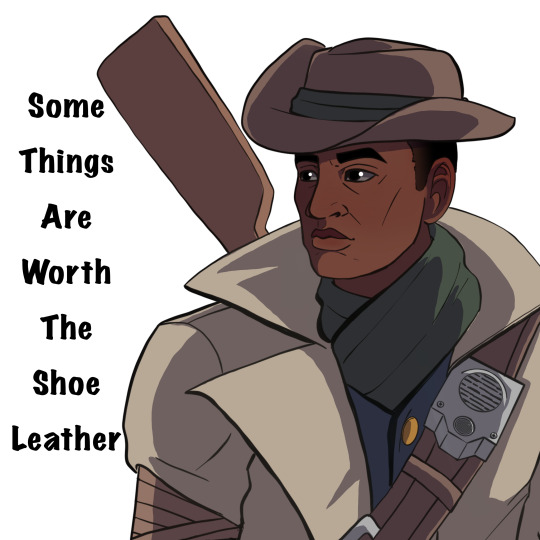
I love him so much.
Still trying to get better at faces cause -yikes-
#preston#prestongarvey#preston garvey#fallout#fallout 4#art#digital art#fo4 companions#minutemen#I wanna hug him and hold him close and pat his head so he can relax a little#then i'm gonna force the generalship on him cause i'm busy gathering blight in far harbor thank you#my art
125 notes
·
View notes
Text
the introduction: In this book I will reexamine the hero-worship of Kutuzov pushed by Soviet historians
the text: Napoleon rejoiced when Kutuzov was pushed out of executive command because he knew that that meant he had a chance.
#my generalship is not good enough to know if that's true#but it's SO funny to say you're not doing hero-worship and then say 'napoleon quaked in his boots at the mere mention of his name'
18 notes
·
View notes
Text
the more i learn about Custer's promotion to brigadier general in the Civil War the funnier it gets. Pleasonton got him promoted and asked where he wanted to go and Custer asked to lead the Michigan brigades since he'd served with them and he spent a lot of time in Michigan and Pleasonton immediately fired the current general just so his special little guy could be with his favorite brigade. Custer is the equivalent of a purse dog to these superior officers
#psy's no punctuation posts#custerposting#Copeland was understandably pissed bcs he was trying to get the brigades reorganized and right#and then Pleasonton is like. alright times up. get out so my little baby can run them instead :]#he was only 23. talented fella militarily but way too young for the generalship imo#it did work out for him. i'd say his career in the Civil War was drastically better than his military career during the Indian Wars#but still. Pleasonon saw this fuckin. toddler and was like 'i MUST have him as a general'#i mean he also promoted Wesley Merritt and Elon Farnsworth and they were babies too but Custer was so immature too
3 notes
·
View notes
Text
"Armies do not fight wars; nations fight wars. War is not a military activity conducted by soldiers, but rather a social activity that involves entire nations."
Army Lt. Col. Paul Yingling ("A Failure in Generalship," Armed Forces Journal)
#writeblr#militarism#military research#writing research#military generalship#individual failures#nations at war#nations go to war#politicians wage war#civilians fight them#probability and policy each play their role in war#the stakes of the conflict
0 notes
Text
Annoyed amateur teen did it for money at a fake casting
Innocent teen Tiffany Watson pounded by big dicked stalker
Ryan Ryans & Angela Sommers - Hot Lesbian Love
Jovencita Bailando sexy
【ビッチ/人妻】巨乳巨尻ビッチ人妻がエロすぎる!「私のお尻気持ちいい?」ムッチムチ肉弾人妻のケツを突きまくる! 素人 個人撮影 爆乳 Japanese hentai boobs ass milf
Bengali randi fucking outdoor
Group of pornstars hot sex party
PUTINHA CASADA MAMANDO E SENDO CHUPADA
Real Amateur Lesbians And Toys
delicias se pegando
#subnitrate#Baillaud#secundoprimary#overwilily#hokeypokey#Rembert#kuzco#tolidins#Noell#hygromatous#hypothesising#accessively#unassociable#Justice-generalship#Gisborne#sweatband#kukupa#chapatties#Maputo#peristoma
1 note
·
View note
Text
Hot Brazilian Lisa Fucking and Anal
Horny chick Lani Lei wants to please her black man in the swimming pool
minha gata na siririca
Chloe Cherry would be happy to have a birthday sex with the birthday girl Kendra Spade
Indian Randi Couple sex
Coroa branca casada mostrando a bunda e o cuzinho
Naughty blonde Samantha Ryan ass slapped and eaten out upside down
Swedish boys in white briefs and monster cock gay sex movietures
Blonde babe asslicks lesbian neighbor
anal creampie from this nice bottom
#Cornulites#upbray#hypogastrocele#ankaratrite#interned#crocking#curnies#competition#Dovzhenko#paralyzing#surname#exegetics#attorney-generalship#Lilah#protosilicate#memorizations#swanmarking#suckle#Sylva#poltfoot
0 notes
Text
Animated Big Tits Blonde Best Hentai Sex
black sissy bitch walking in her new heels
LESBIAN NUDE BATH
Creampie momy anal porn
Big load inside mouth
Emo gay tub sex xxx The college has now decided to introduce sports
Milf licks teen asshole
Horny Step Brother Fucks His Hot Step Sister When Parents are Away
indian thick cock horny jerk off cumshot
Morra de la escuela manda video
#Dovzhenko#paralyzing#surname#exegetics#attorney-generalship#Lilah#protosilicate#memorizations#swanmarking#suckle#Sylva#poltfoot#desand#batfish#Damour#anatomic#xylotomical#upbrow#cowlick#synodontid
0 notes
Text
ARES DOESN'T DESERVE THE HATE HE GETS. 10 REASONS WHY:
Apart from being the god of war, he was also the god of generalship, manliness and civil order, which means that he was the god responsible for the correct function of every ancient city in order of laws and politics.
As the god of manliness, he was considered to be the patron of a fine man that every man looked up to. He was a fighter, not only as a merit from being the god of war, but he always fought for his beliefs, just like at the Trojan War when he complained to Zeus about Athena's unfair action. Also, he was the best father to his children and always supported them and their mothers, just like Cycnus fighting with Heracles, or when Aeropos' mother died during childbirth and he made it possible for the baby to drink milk from his dead mother's body.
He was the only greek god that never raped a woman. All his sexual encounters were consensual and he always seemed to respect his lovers, because he kept his private life low key and none of them suffered or were subjected to tortures, unlike Zeus' or Poseidon's lovers did.
He was the god of dance. Legend has it that before he was taught how to fight, Priapos, his tutor, refused to teach him unless young Ares knew how to dance. Afterall, war is considered to be the ultimate dance a man could perform in ancient times. Also, he appeared to dance for his daughter's Armonia wedding with joy, leaving behind the animosity for her husband Cadmus. Finally, in the feasts of the Gods, it was said that Apollo played the lyre, while the Harites, Artemis, Hermes and Ares danced with great joy.
He was a forgiving god. Despite his enraged and bloodthirsty behavior, Ares knew how to forgive someone and appreciated what they were doing to gain his trust. After Cadmus slaughtered the Dragon, he was put 8 years under servitude to indulge Ares. Finally, Ares not only forgave Cadmus for his crime, but he also blessed his wedding with his own daughter Armonia. Cadmus, in order to gratify the god, built the city of Thebes and made Ares its patron god.
He wasn't a coward. Many greek myths refer to Ares' lack of courage to face danger. This is far from true. At the Trojan War, when he found out about Ascalaphus' death, he disobeyed Zeus' order with the risk of his immortal life in order to go to the battle amd avenge his son's death. He was later stopped by Zeus' thunderbolts. Also, when the Aloadai were about to take Olympus, he was the first god to interfere in battle in order to save Olympus. Afterall, one of his epithets was "Olympus' Protector".
He was sentimental. At the Trojan War he was seen greaving for his children's loss and always wanted to inervene for their safety. Also, he understood the rejection of his parents towards him and he was a lonely god that lacked love. But he found the love he was seeking to Aphrodite, and did not only lust her, but he loved her deeply. Together they had 8 children, and both of them were jealous about each other's affairs, because of Adonis and Eos. They also had an open relationship, because he never refrained Aphrodite from her nature, which was love and sex. Afterall love is not meant to be given to only one person.
He was the protector of women. When Hallirothios attempted to rape his daughter Alcippe, he flashed in the scene and brutally killed the rapist. From that moment on, a temple in Athens was built for Ares "Gynaikothoinas", which means the one feasted/worshipped by women.
He knew the feeling of loss. A war has two sides, the winners and the defeated. A war isn't always to be won, and everyone must learn what it is to lose. He lost many wars, but he also won many. That's why he is among the Olympians.
He was a god of justice. That is because he was referred to be "Themis' Ally", which means that he was a helper to the goddess of justice. One of his least famous daughters, Adrestia, was the goddess of balance, justice and retaliation. Also, "Areios Pagos" or aka "The hill of Ares" was named after him because he was the first man ever to be tried for substatial homicide, for slaughtering Alcippe' rapist.
DON'T TREAT MY BOY LIKE THAT! HE IS JUST ADORABLE!
1K notes
·
View notes
Text
The Parallels Between Holst Goneril and Miklan Gautier
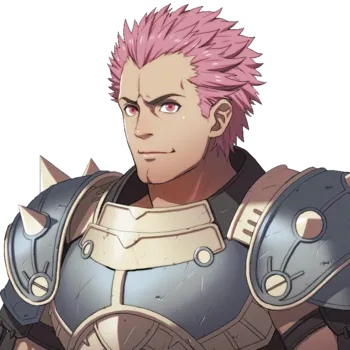
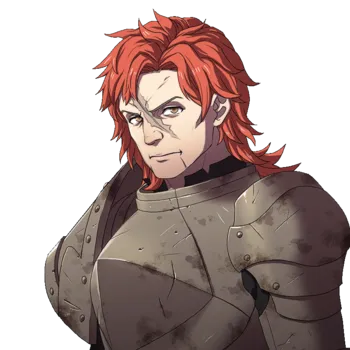
Holst and Miklan have a surprising amount of things in common: they're both from noble families that have traditionally protected Fodlan's borders from foreign invaders (House Goneril with Almyra and House Gautier with Sreng), they're both crestless (meaning they are unable to use their families' relics in defense of said borders), they both prove to be capable fighters and leaders despite lacking a Crest (Holst at Fodlan's Throat, Miklan with his bandit group in Houses/being given a generalship in Hopes), and they both have younger siblings who do have Crests (Hilda and Sylvain).
And yet their paths in life and attitudes towards their siblings couldn't be more different. Holst is the Hero of Leicester, the greatest general the Alliance has ever had, a man respected and beloved by just about everyone, and later becomes Duke Goneril after inheriting the title from his father. He also is a doting big brother to Hilda who adores her and is overprotective of her to an almost unsettling degree. Meanwhile Miklan canonically abused and tried to kill Sylvain multiple times before being disowned, and went on to become a leader of a group of bandits that terrorized Gautier, with his final fate either being transformed into a Demonic Beast after using the Lance of Ruin in Conand Tower and killed (Houses) or being conscripted into the Kingdom army and dying in defense of Arianrhod (Hopes).
Why?
If their beginning circumstances were so similar, then why did Holst's and Miklan's lives turn out so differently? Is the difference something inherent to their characters? Or is it something else?
Could the difference be in their family situations? We know from Hilda's supports with Byleth in Houses that their parents placed a lot of pressure on Holst to meet their high expectations, that it was stressful for him to live up to those expectations even though he could most of the time, and that on the rare instances he failed, he was devastated by people's disappointment. As for Miklan, we know that his birth mom died in a Sreng attack when he was young and his father became distant and emotionally closed-off following her death. Margrave Gautier later remarried (most likely out of the pressure/desire to have a Crested heir who could wield the Lance of Ruin), but Matthias's second wife did care about Miklan despite him not being her biological son, to the point of being hit hard by his death in Azure Gleam. It's never mentioned how Miklan felt towards his stepmother, though. Still, between the Gonerils' pressure and Matthias's "Wall of Ice" personality, it doesn't seem like either Holst or Miklan would be inclined to see their parents as a source of support.
Could the difference be in their societies? Compared to Fargheus, which puts more emphasis on martial prowess and duty (and thus values Heroes' Relics and consequently Crests for the ability to more effectively fight and defend one's people), Leicester is known for its merchants and its Roundtable politics, so Holst would've been able to leverage his family's money and connections (as well as his own charming personality) to convince people to give him a chance despite his lack of a Crest more effectively than Miklan could've in Fargheus. Additionally, Crests are not only valued for granting the ability to use a Hero's Relic, they are also seen as blessings from the Goddess, so the Holy Kingdom of Fargheus would see Crests as even more special for that reason, while the less devout Alliance wouldn't care as much about the religious significance of Crests.
Could the difference be in their education? We know Holst canonically attended the Officer's Academy, but we don't know if Miklan ever did; nothing says he didn't but Rodrigue probably would've at least mentioned it offhand if he did, given how much Rodrigue loves to bring up his old school days with Lambert. Of course, even if Miklan didn't attend Garreg Mach, it's not clear if it was due to a lack of interest on his part or his parents deciding it wasn't worth it for him. We do know that he still received an excellent education from his dad despite lacking a Crest, and he taught him everything he knows. Still, Holst attending the Officer's Academy while Miklan was homeschooled could've affected them in other ways, as Holst would have had the opportunity to form positive relationships with more people and expand his worldview, including the idea that Crests (or his lack thereof) didn't have to define him nor his ability to be successful.
Which leads into my next question: could the difference be Holst's friendship with Balthus? Seeing how much grief his best friend suffered from his stepmother due to having a rare Crest while her son didn't might've convinced Holst that having a Crest didn't make someone inherently better or luckier. Also, having someone who valued Holst as a person instead of for his Crest/crestless nature from a young age (Holst and Balthus have been friends since they were teens, if not earlier) would've helped Holst's self-worth. Meanwhile it's unclear if Miklan ever had any friends: Sylvain's friends all hate Miklan for obvious reasons, and Glenn (the only other person we know of who would've been close enough in age and location to possibly be friends with him) is just a huge unknown in general - though if Glenn was half the honorable knight he is described as by others, he would've hated Miklan too if he knew about Miklan's abuse of Sylvain. The closest thing Miklan would've had to friends at the time of Houses/Hopes is the group of bandits that he led, and even that was more likely a leader/subordinate relationship rather than true friendship.
Another thing to note: Holst's and Miklan's attitude towards Crests. Miklan hates the Crest system because it was the reason Sylvain was chosen as heir to House Gautier over him, and hates and abuses Sylvain for "taking what should've been his", telling Sylvain he "should've paid for that Crest," and ultimately stealing the Lance of Ruin in Houses (which could be interpreted as Miklan taking what he considers to be "his" inheritance, given that the name of the chapter where you fight him is called "The Gautier Inheritance"). Notably Miklan seems more mellow in Azure Gleam, where he's able to earn respect as a general despite his status as a disowned crestless noble and former criminal - which strongly suggests that most of his anger/hatred comes from envy for the power and prestige associated with having a Crest. Holst's feelings regarding the Crest system are never explicitly stated, but it is telling that the Book of Crestology is one of Holst's disliked gifts in Hopes. In Golden Wildfire, while Holst doesn't oppose the Church of Seiros as a whole, he also says "to accept the teachings of Seiros unquestioningly is to abandon reason itself", suggesting that Holst disagrees with the Church on at least some issues - as such, say, the importance of Crests. Yet unlike Miklan, Holst holds no resentment towards Hilda for being born with a Crest when he wasn't - if he does, he hides it very, very well. Which poses an interesting possibility: could Holst's protectiveness and excessive declarations of affection towards Hilda be compensation for any ill will he may have felt towards her in the past, even if he never acted on it? Or a reactionary psychological response to whenever he does feel resentful towards her? (I.E. countering any impulse to hate/hurt Hilda with the reminder that he DOES love his sister and wants to keep her safe.) Another possibility is that seeing Balthus getting along well with his crestless half-brother is what convinced Holst that Crests don't have to get in the way of him having a good relationship with Hilda.
I've written a lot on this topic already, but I just want to share some final thoughts: Azure Gleam shows that Miklan could have easily become a renowned general like Holst if given the investment and opportunity, especially the Reunion at the Fortress City chapter (where Gwendal calls him "Sir Miklan" after Miklan dies out of respect for Miklan's skilled defense of Arianrhod while it was under siege by the Empire). And if Miklan could've turned out like Holst, then Holst could've turned out like Miklan. And yet Holst was able to rise above his family's and society's expectations to become a great general, while Miklan was unable to move past his resentment and blamed others for circumstances of birth beyond anyone's control. What made the difference? We may never know for sure. Perhaps it was something inherent to who they are as people; perhaps it was one of the reasons listed above; perhaps it was multiple reasons or something else entirely. Comparing what little we know about these two still provides us with a fascinating character study, and I wish we knew more about them, their families, and their early years so that we could dive even deeper.
#fe3h#few3h#fe3h analytical#fe3h meta#holst sigiswald goneril#miklan anschutz gautier#hilda valentine goneril#sylvain jose gautier#character study#my post#long post#child abuse mention#I've had this rotating in my head ever since learning that Holst was crestless from Hopes so that's why this is so long#I may follow this up with a post examining the parallels between Sylvain's and Hilda's characters sometime in the future#I really wish Sylvain and Holst had supports together#Just so they could talk about stuff like this
30 notes
·
View notes
Note
Okoye took her role as a Dora Milaje very seriously. It hurt me to see her get her spear taken away from her and removed as general. How do you think Attuma would react to the news and comfort her?
Ooh thanks for this! I am of the exact same thinking as you. Okoye being stripped of her generalship hit me hard as I am a huge fan of hers, and I can only imagine how devastated she must feel. I like to think that, despite being brash and seemingly uncaring, Attuma of Talokan has a definite soft spot for the Wakandan Warrior Beauty.
There’s a curiosity there; Attuma wants to know more about Okoye. He feels an affinity towards her. And there is an inkling of something that the Great Talokanil Warrior has not felt in an age: Culpability. He has, after all, played his part in her failings as a leader and protector. He has never felt guilt about exacting what he has needed. Never felt remorse about enacting his duties.
When he received word that Wakanda’s General had been humbled, he felt a pang of guilt somewhere deep inside his chest. He had been feeling many things since he had first met Okoye, and all of these emotions had shaken him. The news of her relegation sat heavy on him like nothing else had for a long time.
He understood Okoye. He knew what it was like to commit your whole existence to the protection of your home and to the throne that oversaw it. Attuma was reminded of his own life. How fickle those in power could be. How, despite the countless number of times you had proven yourself worthy, loyal, and skillful, all of the privilege and honor that came with it could be stripped away the moment you make a mistake.
Attuma understood it was a grave mistake, losing a Princess to an enemy, but he also knew the Princess had volunteered to go. He also knew Okoye had fought with every ounce of her fortitude to stop what had happened. Did the Wakandans not know that? Did they not grasp the formidable might of Talokan? Did they not know their Princess was reckless?
Attuma understood the pressure Okoye was under. This failing was not hers alone, yet she had borne the repercussions of it alone. He wondered if, in the wake of everything that came after, she would be blamed for that as well. It was no wonder she fought so hard in their final battle. No wonder she had adopted new fighting implements. Attuma admired her tenacity. He admired her strength. He admired her.
After the dust had settled, and the ink was barely dry on the Treaty that Wakanda and Talokan had ratified, Attuma went to Okoye. He found her quaint home. She found him at her front door and placed the tip of her grandmother’s spear to his neck. He laughed. Not because of arrogance, but because he would not expect anything less from the Warrior Beauty.
“Just because our nations have formed an alliance,” she spoke plainly in his mother tongue. “Does not give you the right to seek me out at my home. If there are strategic military matters that need discussing, you are to speak with General Ayo.”
“I do not wish to speak with anyone but you,” Attuma replied, in ungainly Xhosa. “How are you faring?”
“Excuse me?”
“Are you well?” Attuma pressed. “Word of your sending down reached me. I am sorry. Are you well?”
Okoye was struck with confusion for a beat, before she blinked in rapid succession. She drew the spear away and stood staring at the Talokanil warrior. Attuma turned so that he was facing Okoye. She could see the sincerity behind his eyes. He was genuinely asking about her wellbeing.
“I – I am coping,” Okoye mustered as Attuma nodded his head. “Come inside.”
She opened her door, and he accepted the invitation graciously. Okoye stepped inside and closed her door. She gestured for Attuma to take up a seat. They sat across from one another and stared.
“My apologies for putting my spear to your throat,” she finally said.
Attuma smiled at her, and it seemed fond.
“I would have expected nothing less,” he said, causing a small smile to play on her distracting lips.
An awkward silence pervaded the space between them before Okoye spoke.
“This is all very new to me,” she admitted. “Not being in charge. Having to sit idly by. It has not been easy. It feels like I have to start from the beginning, all over again. I do not know if I can.”
“You can and you will,” Attuma said quickly.
It shook him to see such vulnerability from such a staunch warrior, but he knew she was more that that. She was a subject who was mourning her Queen; she was a dishonored soldier; she was a woman who was feeling lost and alone. She deserved better than his clumsy use of her language to offer some sort of comfort. Okoye deserved all of the stars in the night sky. It dawned on Attuma, as he sat there staring into her sad brown eyes, that he wanted to be the one to give her the stars.
“Okoye of Wakanda,” he said softly and gently. “This will pass.”
She nodded her head before dipping it and wringing her hands together.
“My people have known a deity named U Kʼux Kaj,” said Attuma as Okoye lifted her gaze to meet his. “U Kʼux Kaj blew a great wind over the nascent ocean, the ocean before the one we have come to know. And from these great waters the land arose and took form, and from it, life flourished.”
“I appreciate and respect you sharing this with me,” Okoye replied in earnest. “But why?”
“Because it is my cultural mandate to share,” said Attuma proudly. “And because I want you to know that things do change, often for the worse, but you can emerge and flourish. You, Okoye of Wakanda, you will emerge and flourish.”
So, I got a little carried away here, but my point is: Attuma, as an Indigenous man, will show comfort by sharing part of his culture (I’m Indigenous, too, and this is how we show caring). He will honor Okoye's oral traditions by speaking to her where he is otherwise a man of few words. A lot of cultural respect and sharing would happen. Well, that's how I imagine it. I might as well write the entire fic now hehehe
Thank you.
244 notes
·
View notes
Text
Bonus Round: Best General
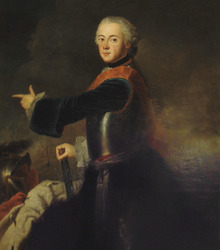

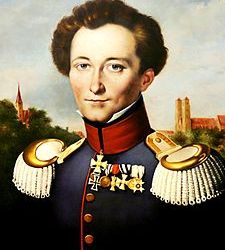
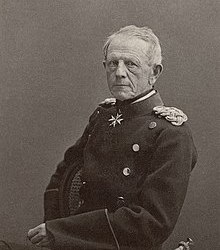
Prince Heinrich of Prussia (1726–1802)
Prinz Heinrich prominently served as a general during the Seven Year's War. What contemporaries and historians alike have found so impressive about his leadership was that he made so few, if any, blunders in carrying out the war. This was a sentiment echoed by his brother, Frederick the Great, who absorbs much of the credit by osmosis. His victories and maneuvers allowed his brother to carry on a war that the prince would have preferred to be ended sooner than 1756. Outside of war, he is his own colorful character, in line with that generation of Hohenzollern men and women.
Gebhard Leberecht von Blücher (1742-1819)
What hot blooded Prussian does not know the name Blücher? It is he we have to thank for the defeat of the villain Napoleon - not once, but twice! The first great defeat at Leipzig restored Prussia to her place of due prominence among the nations of Europe. At Waterloo, he and his troops arrived as Wellington's guardian angels to defeat the Corsican devil. The main army battered, the reserves shunted away, Blücher became an immortal hero to all who opposed shrimpy French tyranny.
Carl von Clausewitz (1780-1831)
Clausewitz's greatest achievement is his book Vom Krieg (On War), a tome that rewrote the rules of conflict for a post Napoleonic age. Among many of the revolutionary ideas contained with in it, a few to highlight are the "fog of war", the concept of friction and the idea of a military genius.
Helmuth von Moltke the Elder (1800-1891)
As Chief of the Prussian General Staff, Moltke worked hand in hand with War Minister von Roon to deliver three swift victories for the Prussian state. It was his genius on display during Königgratz, during Sedan and Metz and Gravelotte. Without him, Prussia's ascendancy and Germany's unification would not have been possible.
Moltke understood that with the growing size of modern armies, generalship such as that underneath Napoleon or Blücher was unfeasible. Instead of a general leading his army as a whole, Motlke devised a corp system wherein smaller clusters of troops would move independently of each other — Theodor, get your hands off of me!
#hohenzollern bracket#bonus round#prince henry of prussia#prinz heinrich von preussen#gebhard von blücher#carl von clausewitz#moltke the elder#staffer theodor#staffer leopold
27 notes
·
View notes
Text
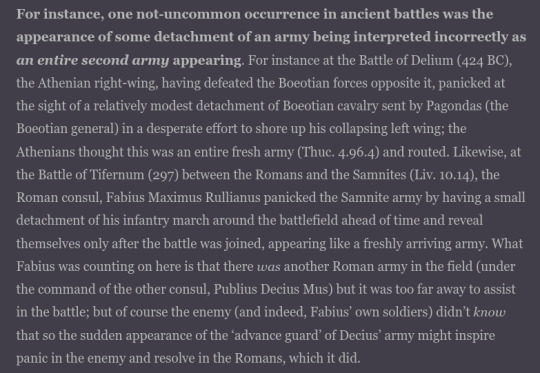
Starting on ACOUP's series on historical generalship and command, and I quite liked this touch. Being historically accurate doesn't mean you can't be incredibly interesting.
Also, tagging @caxycreations for an interesting historical military 'tactic', which reminded me of that eternally infuriating Art of War post of yours from a while back.
12 notes
·
View notes
Text
Now is as good a time as any to discuss the succession of the generalship. I personally interpret this to happen one of two ways:
The normal way is through ceremony, in which the scroll containing the spirit of Lan's avatar (eg. the Lightning-Lord) is passed down to the inheritor of the Arbiter-General's throne and thus the inheritor of Lan's authority. As the Arbiter-Generals are effectively the spokespersons of the Hunt, this method is seen as Lan's approval, though whether or not THEY are actually directly involved in the decision is unknown.
The second, and unfortunately more common way, comes with the death of the current Arbiter-General, more often than not killed in battle. In this case, Lan THEMself will bestow the spirit onto a successor of THEIR choosing, though if the late Arbiter-General had a successor in mind, the candidate will typically align with that person.
This is how Jing Yuan succeeded the throne, though at the time of Teng Xiao's death he had not been told of Teng Xiao's intent for Jing Yuan to succeed him. His death was an unexpected one, too sudden and cruel. In the wake of the Sedition, the Reignbow Arbiter's trail was seen streaking across the sky, and thus in the moment Teng Xiao was killed, an Arbiter-General was born.
10 notes
·
View notes
Text
Thinking endlessly about how the classical Athenians were like, so, on the one hand, many administrative tasks on which our civic apparatus relies require expertise.
But on the other hand, if we appoint leaders to necessary positions on the basis that they're the ones who are best suited to that work due to knowing all about it, that's putting real power in their hands, for an extended period instead of a safe little increment, which sets up our nice democracy of Every Free Adult Native Male Who Can Afford Armor to collapse very quickly into a narrow oligarchy.
But the fact remains that administration actually is skilled labor, especially on the tens-of-thousands-of-people scale they were dealing with, and also involves situations where it's impractical to run every step of a process through a committee. Not that they really wanted to acknowledge this but they were stuck with it a bit. If nothing else, people have day jobs, they can't always be voting.
But fulltime governators for whom this is their day job have too much power.
And the way they solved this was, most of the institutional memory and expertise and even exercise of force in the name of civic order was invested in slaves.
Mint workers? Executive accountancy clerks? Cops? All state property.
Very Important Job of distinguishing counterfeit coinage: public slave. Fifty lashes if he shirked or fucked up or cheated. Considerable authority in the context of the job. Could live quite a comfortable life. Absolutely no chance of his using this role as a springboard for building a political base and usurping authority, because he didn't have legal status.
This freed the actual executive positions up to be filled by people given one-year terms by lottery who had the authority to make (routine) calls but no personal power associated with the office; they didn't have to know shit to do the job and this kept them interchangeable.
Except generals, apparently. The Athenians were like, okay generals really do have to know what the fuck they're doing or we'll all die, but we can't make military service the defining feature of citizenship, and then put ourselves under the command of a non-citizen.
(Not even because like they couldn't entrust a slave with so much power, although being under threat of a lashing if people don't like your decisions probably isn't great for making strong strategic and tactical calls; it's the cognitive dissonance.)
So they had ten elected generalships, with less term limitation, and it was in fact a good avenue by which to build a political career.
But like, what the fuck huh?
#hoc est meum#slavery#it was a pretty stable system as these things go#but i just feel like the fact that they outsourced these features of governance#to slaves#in order to maintain their democratic institutions#without the corruption of letting anyone hold enough power to Be The Polis#is like. we should keep that in mind. when analyzing how our modern systems function#huh?#classics#yes this is an oversimplification#but in the same way that you can't analyze sparta without the messenes i think you have to understand#the athenian democracy in terms of the public slaves#who allowed them to defray the logistical burden of the system#otherwise you risk going If People Would Just Not#on the basis of a precedent where they also didn't Just Not
43 notes
·
View notes